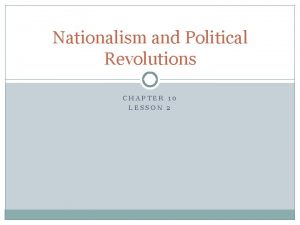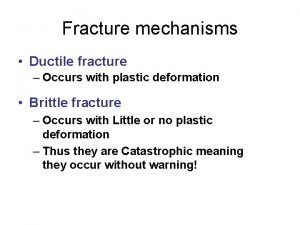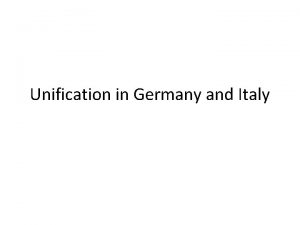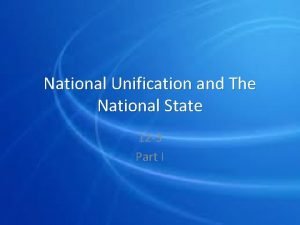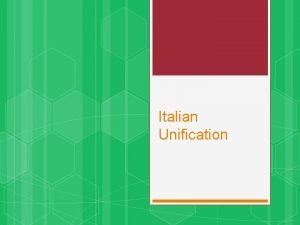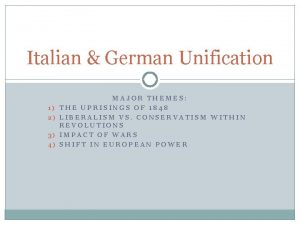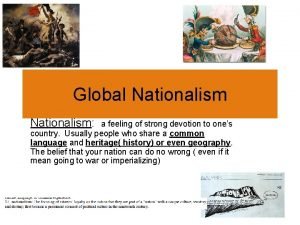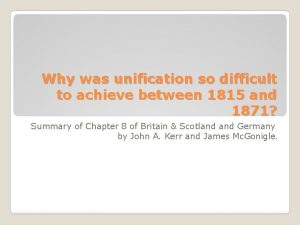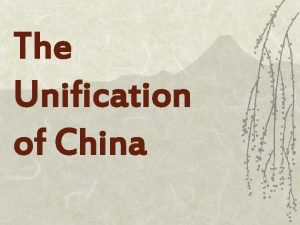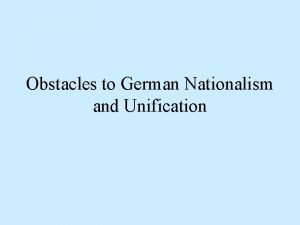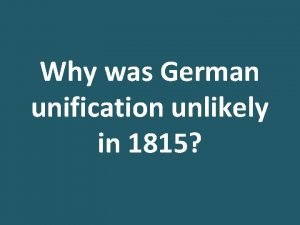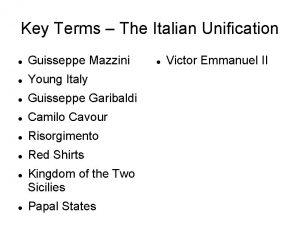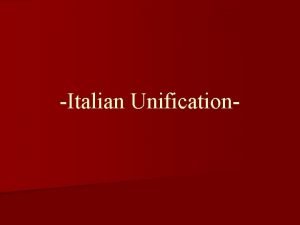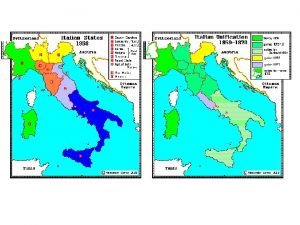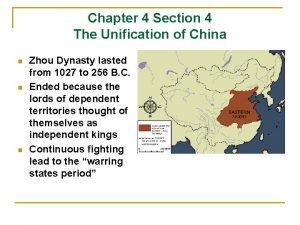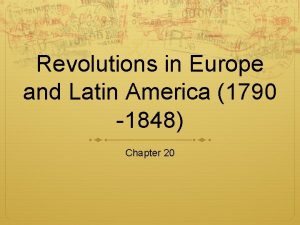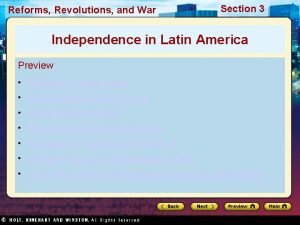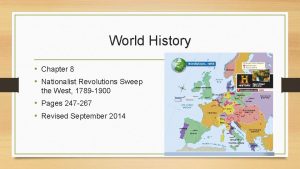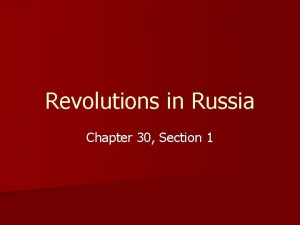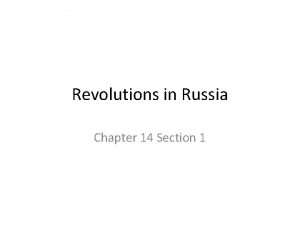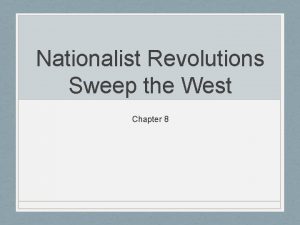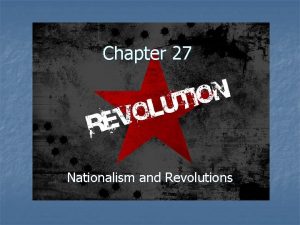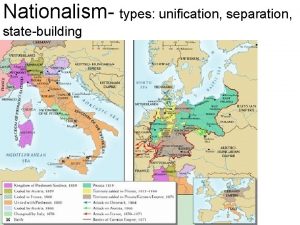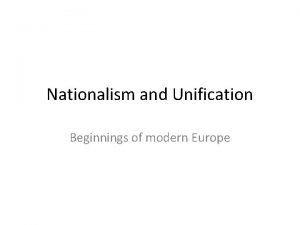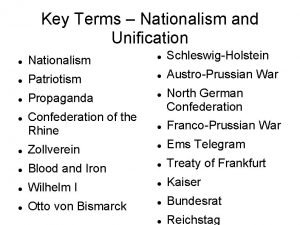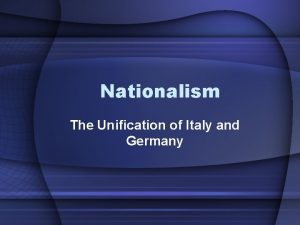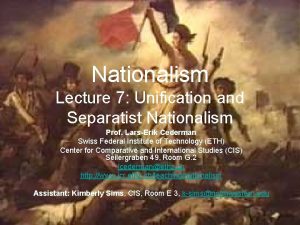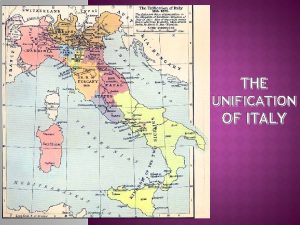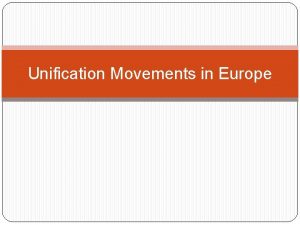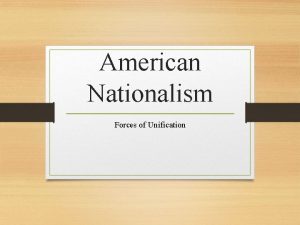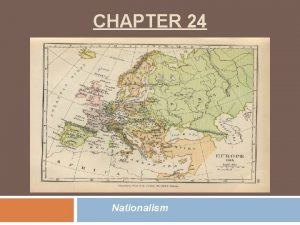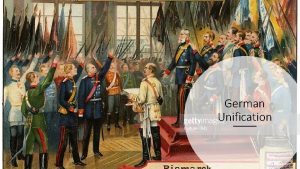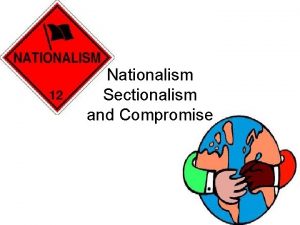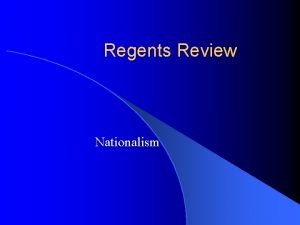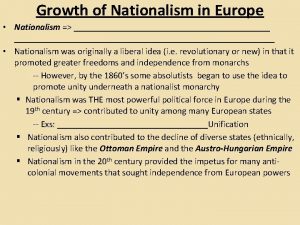Nationalism and Unification Failure of the Revolutions of










































- Slides: 42

Nationalism and Unification

Failure of the Revolutions of 1848 A. France: Louis Philippe & Louis Blanc B. Italy: Giuseppe Mazzini C. Austria: Hungary & Francis Joseph D. Germany: National Assembly & Frederick William E. “Age of Realpolitik” - refers to politics or diplomacy based primarily on power and on practical and material factors and considerations, rather than ideological notions or moralistic or ethical premises. In this respect, it shares aspects of its philosophical approach with those of realism and pragmatism.

The Crimean War 1853 -1856


• Why? Ø Religious Issues Ø Ø Ø Russia Vs. Ottoman Empire OE gave France/RC control of some Christian sites in Holy Land Rus. occupied OE provinces of Moldavia & Walachia in order to “protect” Orthodox Christians Russia Warm Water Port

Russia Vs. France & Great Britain • Sided w/ OE Ø 28 • March 1854 – Declared war on Rus. Why? Ø Naval & commercial interests in Med. Ø Napoleon III – help raise popularity @ home • Austria & Prussia = neutral


Outcomes • • Both sides = poorly equipped and commanded Sept. 1855 Rus. fortress (Sevastopol) fell to Fr. & GB

A War of Firsts • Medical Treatment – High death rate (1 in 6) due to unsanitary conditions • Cholera • Typhus • Dysentery – Florence Nightingale + 38 nurses volunteered – Fought deplorable hospital conditions – Result: better sanitation & fewer deaths Florence Nightingale, British Heroine

Nightingale Nurses of Crimean War

A war of Firsts • • Journalism Photo-journalism – First war photos ever Roger Fenton (GB) – First War Photographer

Allied Camp at Sevastopol

The tombs of the generals on Cathcart's Hill

Cossack Bay, Balaklava.

A British Officer

British Hussar (Calvary)

British Officers

French Soldiers

French General Bosquet Giving Orders

Ottoman Soldiers

Treaty of Paris - 1856 • • Ended Crimean War Required Russia to: Ø Surrender territory Ø Recognize neutrality of Black Sea Ø Renounce claims of protection over Christians in OE • Shattered Russia’s mighty image

Outcomes Post-Treaty • Concert of Europe shattered Ø Nations more willing to fight to overthrow existing orders than to fight to defend them • • Austria asserted more influence w/in the Germ. Federation Prussia unhappy with a secondary role (behind Austria) in Germ.

Consequences • • Europe = unstable apx. 25 years Without the Concert, each nation thought it was only restrained by limits of its Ø Ø military power diplomatic influence

Second French Republic A. New Constitution 1. Louis Napoleon III a. “positive program” b. Coup d’etat – 1851 2. Emperor Napoleon III a. French army rescued and restored Pope Pius IX b. Economic gains B. Two periods: 1. 1851 -1860: Direct & authoritarian rule 2. 1860 -1870: Series of liberal reforms a. relinquished power to National Assembly

Napoleon III’s regime in France Would have been overthrown by revolution had it not been for the Franco-Prussian War. Was popular only with the middle class. Became progressively more authoritarian. Combined economic success with authoritarian government. Resisted industrialization in an effort to preserve traditional French society.

Italian unification 1858 -1870


Beginnings of Nationalism • • Napoleon – united many states under 1 gov’t COV – – Split Italian states w/ no regard for national groups Placed under control of large empires: • • Austria France

Secret Societies Italian artists, writers, thinkers became interested in celebrating Italy’s cultural traditions Others formed secret societies to work for political change Some even plotted to overthrow the Austrian government in Italy

Mazzini & Young Italy 1831: Giuseppe Mazzini, launched a nationalist group called Young Italy to fight for unification of the Italian states Mazzini had been exiled but smuggled patriotic pamphlets into Italy Young Italy attracted tens of thousands of Italians to the cause of unification

Secret Societies • Carbonari – – – Secret society inspired by Fr Rev Members: mid-class, intellectuals Anti-RC Church • – Pope excommunicated them Pro-Unification

The Path Toward Unity • • As nationalism grew, some Italians led unsuccessful rebellions Then, two men rose to lead a successful movement to unify Italy…

Count Cavour • • • Camilio di Cavour Sardinia Founded the nationalist newspaper, Il Risorgimento - or “resurgence”

Kingdom of Sardinia • • • 1852: Cavour = Prime Minister Rebuilt economy w/ goal of unification (monarchy) Strategic alliance w/ France – – Sardinia supported France in war with Russia & gave them the provinces of Savoy & Nice In turn, France supported Sardinia in its war against Austria - (successful liberation)

Garibaldi & the Red Shirts • • • Mazzini = “heart” Cavour = “brain” Garibaldi = “sword”

Garibaldi • • • Young Italy member (1833) At Cavour’s request, fought against Austria (1854) Result: Gained Lombardy from Austria


The Red Shirts • Red Shirts = Garibaldi’s followers By July 1860 - gained control of Sicily By September - conquered Naples • Garibaldi wanted a republic, but … • • • Kingdom of Two Sicilies Sardinian king Victor Emmanuel II

Unification • • 1861: territories held elections, all agreed to unification Holdouts were Venetia, still belonging to Austria; Papal States, under French troops supporting pope • 1866: Prussia defeated Austria, gave Venetia to Italy • 1870: Prussia forced French to w/d from Rome • 1870: completed unification under King Victor Emmanuel II

Garibaldi Victor Emmanuel II Cavour


Italian Unification
 Chapter 23 lesson 3 nationalism unification and reform
Chapter 23 lesson 3 nationalism unification and reform French revolution political spectrum
French revolution political spectrum Ventricular escape rhythm
Ventricular escape rhythm Failure to pace
Failure to pace Ductile failure example
Ductile failure example German and italian unification compare and contrast
German and italian unification compare and contrast National unification and the national state
National unification and the national state Prolog langage
Prolog langage Summary of the italian unification
Summary of the italian unification Sardina
Sardina Zollverein germany map
Zollverein germany map Strong devotion
Strong devotion Germany before unification
Germany before unification Unification operating model
Unification operating model Unification first order logic
Unification first order logic Why did germany avoid “wounding austria too severely”?
Why did germany avoid “wounding austria too severely”? Why was italian unification difficult to achieve
Why was italian unification difficult to achieve Unification of china
Unification of china Prolog unification
Prolog unification Obstacles to german unification
Obstacles to german unification Unification algorithm example
Unification algorithm example Germany before 1871
Germany before 1871 Gauge coupling unification
Gauge coupling unification Obstacles to italian unification
Obstacles to italian unification Unification of italy class 10
Unification of italy class 10 Italian risorgimento timeline
Italian risorgimento timeline Stages of german unification
Stages of german unification C section
C section Revolutions in europe and latin america section 2 quiz
Revolutions in europe and latin america section 2 quiz Revolutions and national states in the atlantic world
Revolutions and national states in the atlantic world Shamma al muhairi
Shamma al muhairi Four great revolutions in thought and religion
Four great revolutions in thought and religion How were european rulers guided by enlightenment thought?
How were european rulers guided by enlightenment thought? Revolutions in europe and latin america
Revolutions in europe and latin america Aryan food
Aryan food Reforms revolutions and war answer key
Reforms revolutions and war answer key Wars revolutions and reforms
Wars revolutions and reforms Atlantic revolutions and their echoes
Atlantic revolutions and their echoes Chapter 8 nationalist revolutions sweep the west
Chapter 8 nationalist revolutions sweep the west Chapter 30 revolutions in russia
Chapter 30 revolutions in russia Chapter 14 section 1 revolutions in russia answer key
Chapter 14 section 1 revolutions in russia answer key Which ideas of romanticism would encourage nationalism
Which ideas of romanticism would encourage nationalism Atlantic revolutions in a global context
Atlantic revolutions in a global context

